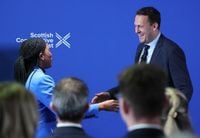As Scotland braces for the 2026 Holyrood elections, the political landscape is shifting in unexpected ways, with senior Scottish Conservatives considering an unprecedented electoral pact with Nigel Farage’s Reform UK party. This move, sparked by fears of a devastating Tory wipeout, reflects broader upheavals in UK politics, where Reform UK is flexing its newfound muscle, not only north of the border but also in London and beyond.
The Scottish Conservatives are facing a daunting challenge. Despite the Scottish National Party's (SNP) internal struggles following Nicola Sturgeon’s resignation and the Operation Branchform police investigation, the SNP continues to enjoy a poll bounce. Meanwhile, both the Tories and Labour are grappling with the rapid rise of Reform UK, which is projected to snatch around 15 seats in Holyrood from a standing start. This surge has alarmed senior Tory figures who are now floating the idea of a tactical alliance with Nigel Farage’s party to avoid splitting the right-wing vote and potentially unseat the SNP.
The proposed pact would see the Conservatives and Reform UK strategically avoid standing candidates in constituencies where the other is expected to perform strongly. This is not mere speculation: 14 Tory councillors have already defected to Reform UK ahead of the 2026 election, and there is anticipation that sitting Tory MSPs might follow suit. However, the idea has met resistance from key figures. Scottish Conservative leader Russell Findlay opposes the pact, and Nigel Farage himself categorically rejected it, telling The Telegraph, “No chance. The Tories are dying in Scotland and I’ve got no desire to do a deal with them whatsoever.” Reform UK’s Scottish organizers echoed this sentiment, emphasizing that they plan to field candidates in all 73 constituencies plus regional lists, dismissing any notion of standing down.
While the SNP has already published its candidate list featuring a blend of former MPs, current MSPs, and younger councillors, both Labour and the Conservatives are still finalizing their selections. Reform UK is actively vetting candidates with assistance from its London team, aiming to present a full slate early next year. The Scottish Conservatives are hoping to stem further defections before then, but the political tides suggest a volatile election ahead.
Reform UK’s momentum is not confined to Scotland. In London, the party recently achieved a landmark victory, winning its first council seat outright. Labour MP Liam Conlon issued a stark warning to his party, highlighting that despite concerted Conservative efforts—including an appearance by Tory leader Kemi Badenoch—the Reform candidate won comfortably. The Conservatives saw their vote share drop nearly 12 percentage points, finishing second with 29.4%, while Labour was pushed into third place with just 18%, a 10-point decline.
Conlon cautioned that this could mark the start of a new political trend. Reform UK already holds several councillors in London, though most are defectors from other parties. The party’s success in local elections earlier this year, where it took control of seven councils including Kent, Durham, and Lancashire, has emboldened its ambitions. Reform UK aims to replicate these gains in the upcoming London council elections in May 2026, with Conservative sources expressing mounting fears that boroughs like Bexley and Bromley could fall under Reform control. Additionally, Reform members believe they can make inroads into Labour strongholds such as Barking and Dagenham and Westminster.
The rise of Reform UK is reshaping the political battleground, but it also invites scrutiny of the broader economic narrative that parties are using to galvanize support. Dominic Lawson, writing in The Times, critiques Nigel Farage’s persistent “broken Britain” rhetoric. Lawson reminds readers of the truly dire period in the late 1970s, when Britain was labeled “the sick man of Europe,” enduring an IMF bailout, rampant strikes, and economic chaos. He contrasts that era with today’s challenges, noting that while the UK faces serious fiscal issues—such as public sector borrowing hitting nearly £21 billion in June 2025, with £16.4 billion devoted to debt interest payments—the economic outlook is not as bleak as it once was.
According to the IMF’s recent forecasts, the UK’s GDP growth is expected to be 1.2% this year and 1.4% next year, slightly ahead of the eurozone’s 1% and 1.2%, respectively. Lawson points out that, unlike the 1970s, the UK is not heading into recession while its European neighbors thrive. Moreover, the inflation rate, though still a concern, is nowhere near the 25% highs of that turbulent decade.
Lawson also highlights the contrast in national psychology, noting that while Britain grapples with economic and asylum challenges, other European countries face their own crises. France, for instance, has even higher public spending and a prime minister warning of an impending fiscal cliff, while Germany’s economic model is under severe strain from global competition and infrastructure woes.
In this context, Farage’s political success is partly due to his skillful use of the “broken Britain” theme, now at the expense of Labour leader Sir Keir Starmer. Farage claims to be “the last chance for broken Britain,” yet his policy proposals are wildly expensive. The Economist estimates his plans could increase public sector borrowing by £200 billion. His pledge to buy 50% of shares in key utilities remains financially vague, as he admitted he had no cost estimate when questioned by the BBC’s Laura Kuenssberg.
Farage’s approach, Lawson suggests, echoes the misguided policies of the 1970s, where increasing trade union power was seen as a panacea. The irony is that while Farage capitalizes on fears of a broken nation, his solutions could exacerbate fiscal instability rather than resolve it.
As the UK heads into a politically charged period, with Reform UK surging in both Scotland and London, the traditional parties face tough choices. The Scottish Conservatives’ flirtation with an electoral pact, the shifting council dynamics in London, and the broader economic debates all underscore a nation wrestling with its identity and direction. Whether these developments will lead to a fundamental realignment or merely a turbulent interlude remains to be seen, but one thing is clear: the political landscape is far from settled.


